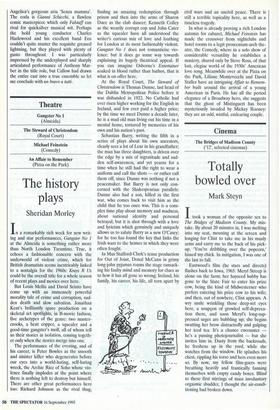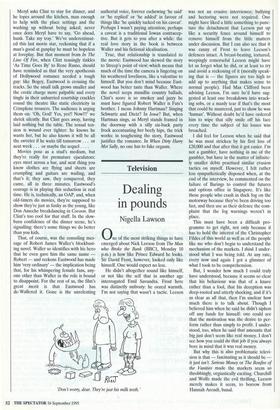Cinema
The Bridges of Madison County (`12', selected cinemas)
Totally bowled over
Mark Steyn
Itook a woman of the opposite sex to The Bridges of Madison County. My mis- take. By about 20 minutes in, I was melting into my seat, moaning at the screen and longing for Clint to take me in his manly arms and carry me to the back of his pick- up. 'You're dribbling over the popcorn,' hissed my chick. In mitigation, I was one of the last to fall.
Eastwood's film (he stars and directs) flashes back to Iowa, 1965: Meryl Streep is alone on the farm; her hayseed hubby has gone to the State Fair to enter his prize cow, being the kind of Midwesterner who prefers entering his prize cow to his wife; and then, out of nowhere, Clint appears. A wry smile wrinkling those deep-set eyes here, a soupcon of growled self-depreca- tion there, and soon Meryl's long-sup- pressed urges are bubbling up; she begins swatting her brow distractedly and gulping her iced tea. It's a chance encounter he's a passing photojournalist — but she invites him in. Dusty from the backroads, he freshens up in the yard, while she watches from the window. He splashes his chest, rippling his torso and hers even more so. By now, my fellow film-goers were breathing heavily and frantically fanning themselves with empty candy boxes. Blind to these first stirrings of mass involuntary orgasmic shudder, I thought the air-condi- tioning had broken down. Meryl asks Clint to stay for dinner, and he lopes around the kitchen, man enough to help with the place settings and the washing up without being asked; never once does Meryl have to say, `Go ahead, hunk. Take my tray.' We've underestimat- ed this last movie star, reckoning that if a man's good at gunplay he must be hopeless at foreplay. But that moment from In The Line Of Fire, when Clint teasingly tinkles `As Time Goes By' to Rene Russo, should have reminded us that the very apotheosis of Hollywood romance needed a tough guy: like Bogey, Eastwood is crossing the tracks. So the small talk grows smaller and the erotic charge more palpable and every tingle in their unhurried courtship crackles round the theatre like static electricity in Crimplene trousers. The audience is urging them on: 'Oh, God! Yes, yes!! Now!!!' we shriek silently. But Clint goes away, having laid nothing but the table. The sexual ten- sion is wound ever tighter: he knows he wants her, but he also knows it will be all the sweeter if he waits till tomorrow . . . or next week . . . or maybe the sequel . . . .
Movies pose as a stud's medium, but they're really for premature ejaculators: eyes meet across a bar, and next thing you know clothes are flying and sheets are crumpling and guitars are wailing, and that's it; they saw, they conquered, they came, all in three minutes. Eastwood's courage is in playing this seduction in real time. He is, technically, an OAP, and, when old-timers do movies, they're supposed to show they're just as funky as the young, like Don Ameche breakdancing in Cocoon. But Clint's too cool for that stuff. In the slow- burn confidence of the dinner scene, he's signalling: there's some things we do better than you kids.
That, of course, was the consoling mes- sage of Robert James Waller's blockbust- ing novel. Waller so identifies with his hero that he even gave him the same name Robert — and reckons Eastwood has made him 'very ordinary' — the implication being that, for his whimpering female fans, any- one other than Waller in the role is bound to disappoint. For the rest of us, the film's great merit is that Eastwood has de-Wallered it. Gone is the unrelenting authorial voice, forever eschewing 'he said' or 'he replied' or 'he added' in favour of things like 'he quickly tacked on his caveat'. Perhaps I wasn't paying attention; perhaps a caveat is a traditional Iowan contracep- tive. But it gets to you after a while: the real love story in the book is between Waller and his fictional idealisation.
True, that relationship is translated to the movie: Eastwood has skewed the story to Streep's point of viev.);-which means that much of the time the camera is lingering on his weathered loveliness, like a valentine to himself. But you don't mind because East- wood has better taste than Waller. Where the novel seeps maudlin country ballads, Clint's score is so smokey and jazzy he must have figured Robert Waller is Fats's brother. I mean Johnny Hartman? Singing Schwartz and Dietz? In Iowa? But, when Hartman sings, as Meryl stands framed in the doorway with a silly six-buck party frock accentuating her beefy hips, the trick works: in toughening the story, Eastwood justifies the romance. In When Dirty Harry Met Sally, no one has to fake orgasm.



































































 Previous page
Previous page